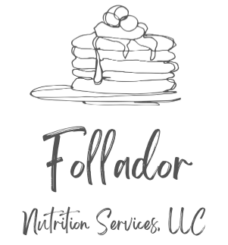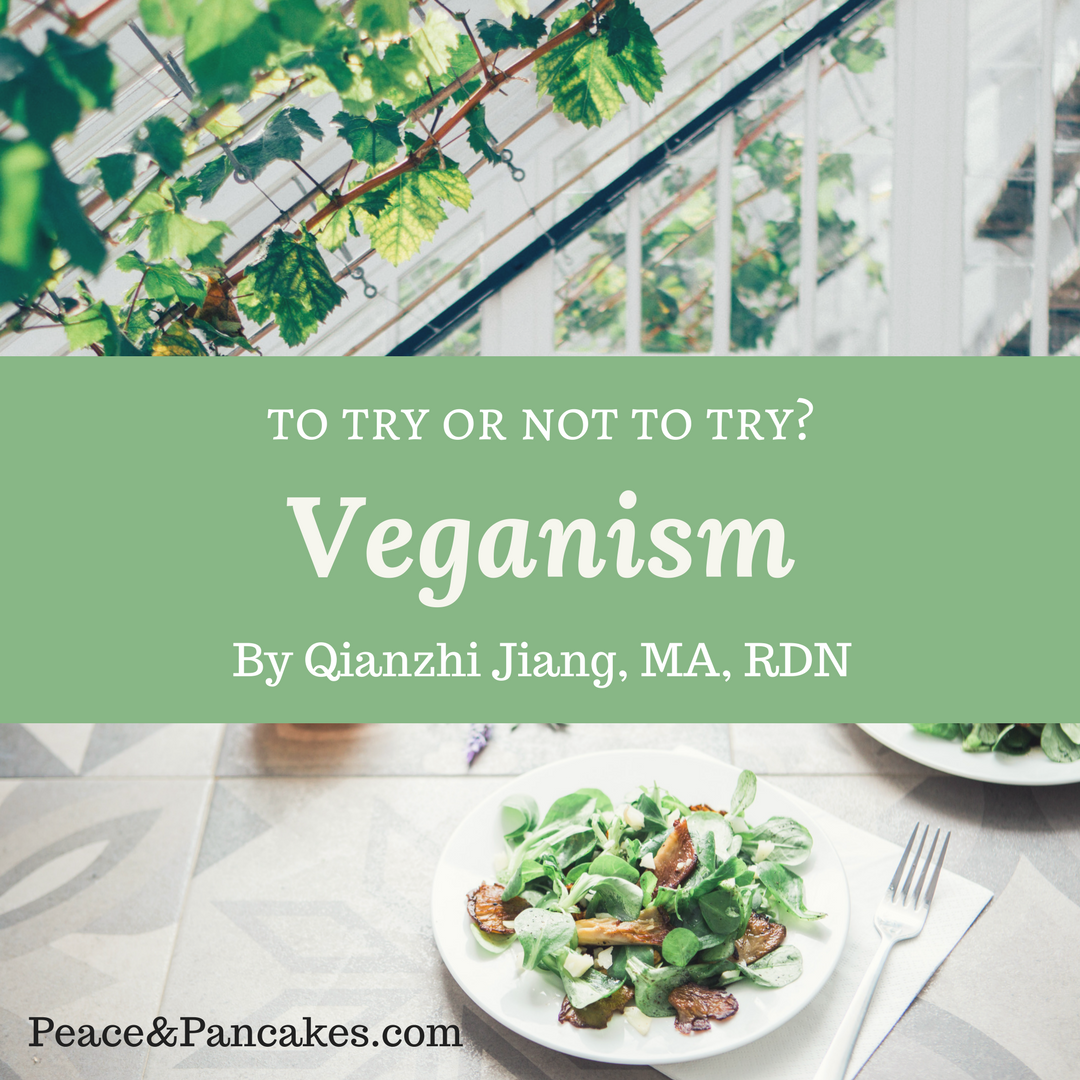This post is part of the “To Try or Not to Try” blog series. Written by a registered dietitian (RD) or dietetic intern, each post explores the claims and science surrounding a different dietary pattern or trend. After compiling this research, each RD or RD2be gave the diet a grade based on whether it appears to hold up to the hype. A = “yes, go for it!” and F = “no way, absolutely not!”
About the Author:
Qianzhi Jiang, MA, RDN was born and brought up in China. Coming from a family where food is used to nurture and celebrate, she has always been interested in discovering new flavors and passing her love for food and knowledge in healthy eating to others. She is currently a PhD candidate in the Department of Nutrition at the University of Massachusetts Amherst. After completing her degree, she is planning on finding a job in the academia, educating the next-generation nutrition professionals, and conducting research to promote healthy eating in the communities.
What is a vegan diet recommended for?
Unlike therapeutic diets that are usually recommended to people by the dietetics society, many people choose to follow a vegan diet of their own free will for various reasons. These range from health concerns, religious beliefs, family influences, to weight management and ethical and environmental concerns[1]. Many believe that a vegan diet leads to increased energy levels, a younger looking appearance and even eternal youth[2]. Some use this plant-based eating pattern as a weapon to fight against obesity and related chronic diseases including heart disease, diabetes and cancer. Others may have eliminated animal products due to personal preferences or sensory disgust. Although going vegan does not guarantee a healthier lifestyle, a well-planned vegan diet can be rich in antioxidants, fiber, vitamins, and minerals that promote optimal nutrition.
Besides weight and health-related motivations, ethical concerns come first with many environment-conscious consumers2. Veganism is the only desirable dietary practice among animal right advocates as they believe that no “ethical meat” exists given the necessity of killing involved in animal product manufacture. In addition, to build a greener world, completely eliminating animal products in our diet is a sustainable way of combating global warming and water insecurity.
What foods are allowed?
A vegan diet is completely free of meat, fish, poultry and any animal products including dairy and eggs. Controversy remains around whether honey, “the dairy of the insect world”, should be excluded, since it is technically produced by bees thus making it an animal product[3].
It’s important to remember that vegan diets may not be nutritious depending on the execution. After all, French fries and sugar-covered donuts can also be vegan!
Are the claims about vegan diets supported by science?
Although many researchers have investigated the health benefits of vegetarian diets, few exclusively studied vegan diets with a follow-up period longer than half a year. Overall, studies showed a significantly greater effect of a vegan diet on weight loss compared with non-vegetarian diets[6], vegetarian diets[7], and the National Cholesterol Education Program diet, which was a moderate low-fat diet[8]. This is likely the result of people on a vegan diet consuming less fat and saturated fat than their non-vegan counterparts5. A vegan diet may also help with type 2 diabetes management and prevent some diabetes comorbidities such as neuropathy pain and renal failure[9]. Vegan diets have been implicated in the prevention of cardiovascular disease and cancer due to their low saturated fat and high fiber and antioxidant content.
Are there any possible hormonal disturbances?
Thyroid hormones may be affected by a deficiency in iodine, resulting in a goiter. Otherwise, if the diet is planned to provide a variety of foods and thus adequate macro and micronutrients, no other hormonal disturbances should occur.
Who should definitely not try going vegan?
With planning, one would receive adequate nutrition while on a vegan diet and reap the health benefits of this eating pattern that is high in fruits and vegetables and thus fiber. However, without proper nutrition education or medical supervision, a vegan diet can lead to severe nutrient deficiencies and may not equate to healthy eating.
A vegan diet eliminates natural food sources of vitamin B12[4], which only comes from animal sources. Vitamin B12 supplements or vitamin B12 enriched/fortified foods should be considered. Pregnant women and nursing mothers should consult with their healthcare providers regarding vitamin B12 deficiency in infants if on a vegan diet.
Vegans may also lack iodine in their diets. Soybeans, cruciferous vegetables such as cabbage, broccoli, Brussels sprouts, and sweet potatoes may actually encourage a goiter, manifested in the form of an enlargement in the neck area.
In addition, although many vegetables are high in zinc and iron, these two minerals are not readily absorbed from plant sources. Hence, the recommended intake of iron and zinc may be double that recommended for non-vegetarians. Studies also showed increased risks for low bone density and fractures since vegans avoid dairy products[5].
Is a vegan diet realistic and sustainable?
Realistic: It can be difficult to comply and requires lots of planning ahead and some basic nutritional knowledge to prevent nutrient deficiencies[10]. Although many information is available on the Internet, one needs to sift through all the do’s and don’ts to identify the science-based advice.
Sustainable: Overall, the plant-based vegan diet is very sustainable when it comes to lower water usage and reduced carbon footprint. However, individual practices may vary causing different levels of impact on the environment[11]. For example, in Rosi’s study, vegan participants consumed significantly more cereals than omnivores, which had a higher carbon footprint.
What are the overall pros and cons of vegan diets?
Pros:
- High in fruits and vegetables
- High in fiber
- Effective in promoting weight loss and chronic disease
- Sustainable
- Vegetables are delicious!
Cons:
- High demand in planning
- Potential deficiencies of vitamin B12, iron, iodine, zinc, calcium and vitamin D
- May need support from family and friends especially if meals are prepared and eaten together
- May have limited choices when dining out or eating with others
What grade do you give a vegan diet?
I would give it a grade of B only because it requires lots of efforts in planning and education. If one is determined to eliminate animal products, it is worth trying after consulting with their healthcare providers and if they have reliable sources for information and support.
What is your general recommendation for a healthy eating pattern for the average human?
My general recommendation for healthy eating is to enjoy real food and eat a balanced meal what makes you happy. Both vegan and omnivore diets can be healthful. The key point is that a diet should provide you with adequate nutrition you need to maintain health. When in doubt, always consult with a Registered Dietitian!
DISCLAIMER:
This content is intended for informational and educational purposes only. It is not intended as medical advice, medical nutrition therapy, or individualized nutrition counseling. Talk to your doctor or another licensed healthcare practitioner before making any changes to your diet, medications, or exercise routine. The opinions of these authors are their own and are not approved, sponsored, or endorsed by any professional organizations including but not limited to the Academy of Nutrition and Dietetics, United States Department of Agriculture, Food and Drug Administration, National Institutes of Health, American Heart Association, and American Diabetes Association.
Sources:
[1] Radnitz C, Beezhold B, DiMatteo J. Investigation of lifestyle choices of individuals following a vegan diet for health and ethical reasons. Appetite. 2015;90:31-36.
[2] Why go vegan? The Vegan Society. Retrieved from https://www.vegansociety.com/go-vegan/why-go-vegan on December 31, 2017.
[3] Daniel Engber. The great vegan honey debate: Is honey the dairy of the insect world? Slate. July 30, 2008. Retrieved from http://www.slate.com/articles/life/food/2008/07/the_great_vegan_honey_debate.html on December 31, 2017.
[4] Planning a healthy vegetarian diet. Mayo Clinic. March 14, 2016. Retrieved from https://www.mayoclinic.org/healthy-lifestyle/nutrition-and-healthy-eating/in-depth/vegetarian-diet/art-20046446?pg=2 on December 31, 2017.
[5] Stacy Clark. Are vegan diets healthy, or do they lead to malnourishment or nutritional deficiencies? Are vegans healthier than omnivores? October 10, 2008. Retrieved from http://healthpsych.psy.vanderbilt.edu/2008/VeganDiets.htm on December 31, 2017.
[6] Huang RY, Huang CC, Hu FB, Chavarro JE. Vegetarian diets and weight reduction: A meta-analysis of randomized controlled trials. J Gen Intern Med. 2016;31:19-16.
[7] Turner-McGrievy GM, Davidson CR, Wingard EE, Wilcox S, Frongillo EA. Comparative effectiveness of plant-based diets for weight loss: A randomized controlled trial of five different diets. Nutrition. 2015;31:35-8.
[8] Turner-McGrievy GM, Barnard ND, Scialli AR. A two-year randomized weight loss trial comparing a vegan diet to a more moderate low-fat diet. Obesity. 2007;15:2276-81.
[9] Pawlak R. Vegetarian diets in the prevention and management of diabetes and its complications.
[10] Vegan diet. Retrieved from https://health.usnews.com/best-diet/vegan-diet on December 31, 2017.
[11] Rosi A, et al. Environmental impact of omnivores, ovo-lacto-vegetarian, and vegan diet. Scientific Reports. 2107;7:6105.

